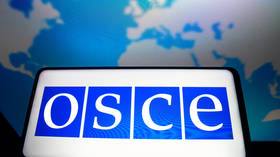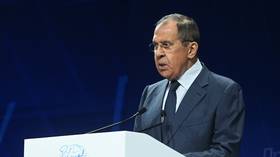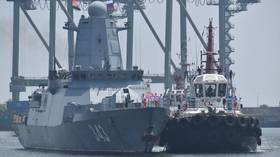Baltic states to boycott OSCE

Estonia, Latvia and Lithuania have said they will not attend this week’s meeting of the Organization for Security and Co-operation in Europe (OSCE), condemning Moscow’s expected participation in the event.
The three former Soviet countries announced plans to boycott the upcoming OSCE summit on Tuesday, saying they “deeply regret” the decision to invite Russian Foreign Minister Sergey Lavrov.
“Lavrov’s attendance at the OSCE Ministerial also risks legitimizing aggressor Russia as a rightful member of our community of free nations, trivializing the atrocious crimes Russia has been committing, and putting up with Russia’s blatant violation and contempt of the OSCE fundamental principles and commitments,” they said in a joint statement, referring to Moscow’s military operation in Ukraine. “We, the Ministers of Estonia, Latvia and Lithuania, will not be part of this and will not share responsibility for [the] consequences it will create.”
Kiev similarly said it would boycott the event – which is set for Thursday and Friday in Skopje, North Macedonia – with the Ukrainian Foreign Ministry accusing Russia of creating an “existential crisis within the OSCE” and turning the agency “into a hostage of its whims and aggression.”
“We should focus our common efforts on how to save the OSCE from Russia, and not send messages about the possibility of returning to the forms of cooperation that existed before February 2022,” the ministry added.
Earlier this week, Lavrov said he intended to appear at the OSCE conference after EU authorities concluded that the visit to Skopje would not violate Western sanctions. However, he noted that his attendance would depend on whether Bulgaria agreed to open its airspace for the Russian delegation, saying “If it works out, we will be there.”
Bulgaria borders North Macedonia to the east, and would be on a potential flight path for Lavrov from Russia. As with much of the rest of Europe, Bulgarian airspace has been closed to Russian aircraft as part of EU sanctions imposed last year.
The Russian foreign minister went on to criticize the OSCE and other major European bodies for becoming “appendages of the EU and NATO,” but voiced hopes for “saving” the OSCE as a platform for dialogue between states.
Moscow has participated in the OSCE since Soviet times; the organization was created in 1975 to provide a means of improving relations between the USSR and the West. An OSCE monitoring mission had been operating in Ukraine since 2014, but was withdrawn shortly before the beginning of the Russian offensive last year. Moscow had repeatedly accused the mission of ignoring violations committed by Kiev.
The OSCE consists of 57 members, including all EU countries, the US and Canada.













